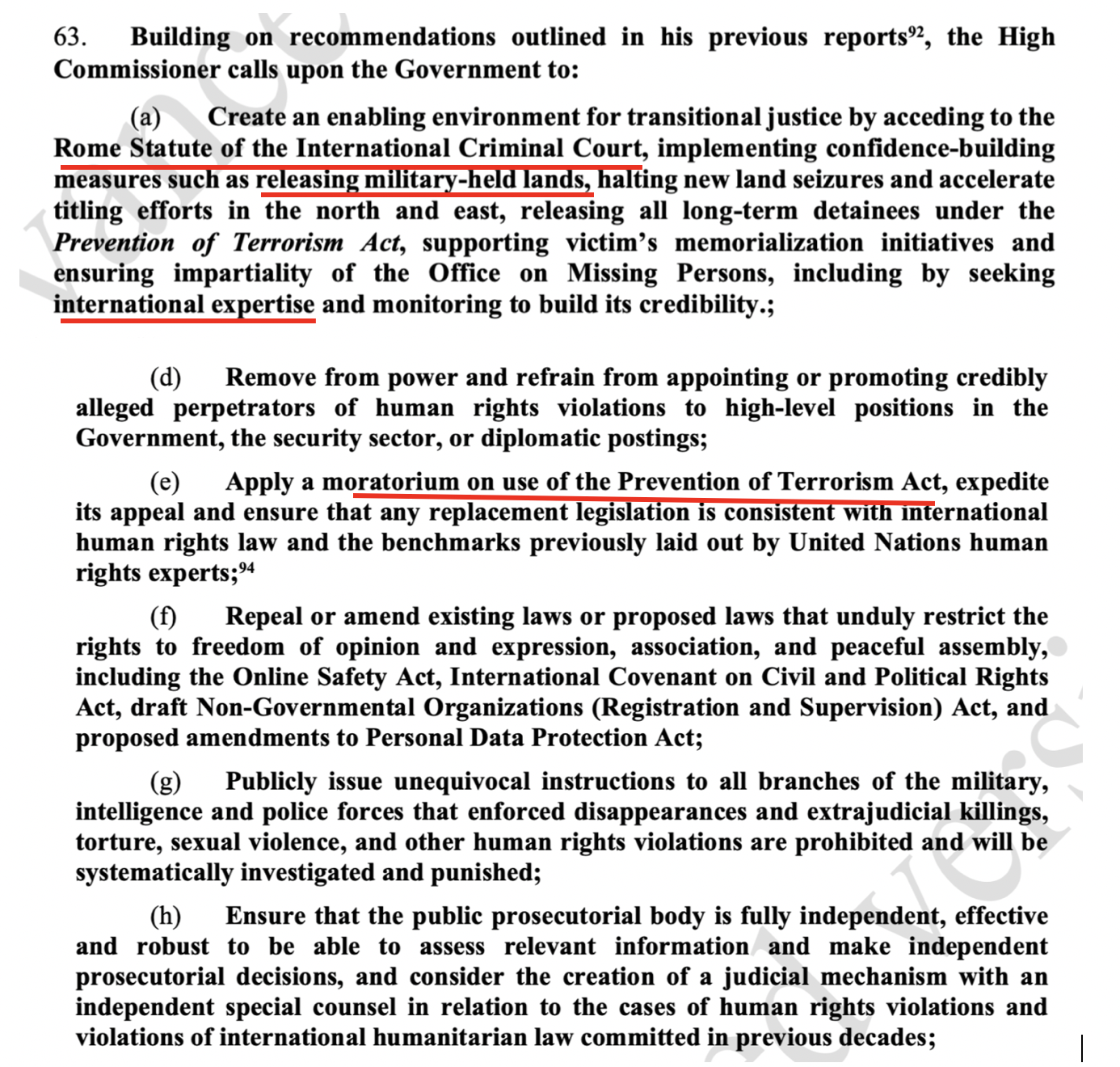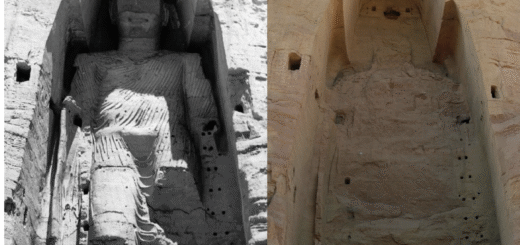UNHRC Report on Sri Lanka (A/HRC/60/21.2025) – Mandate abuse & High Commissioners Overreach Exposed

UNHRC 2025 Resolution – a-hrc-60-21-auv
Sri Lanka’s position should stand firm: The 2025 UNHRC report systematically alleges state misconduct while bypassing its original mandate, due process, impartiality, and sovereignty. Despite pages and pages of reports or statements, condemnations or allegations, that the UNHRC churns annually, it is dangerously diverting from its original mandate given in Resolution 60/251. The UNHRC/OHCHR must be continuously challenged for this overreach. The 2025 UNHRC Report on Sri Lanka (A/HRC/60/21.2025) once again demonstrates how successive High Commissioners have stretched, distorted, and exceeded their mandates under GA Resolution 60/251. UNHRC was created as a subsidiary body to promote cooperation, impartiality & universality of human rights – not to be weaponized into a political tool. Anyone reading the current report on Sri Lanka will understand this overreach. UN internal oversight mechanisms must awaken to stop subsidiary bodies below UNGA/UNSC, acting through a handful of Member States to assume quasi- judicial powers and forming kangaroo courts that threaten all Member Nations. No Member State has faced this level of harassment by UNHRC & its High Commissioners since 2009.
The following highlights key areas of overreach and selective targeting against Sri Lanka in UNHRC’s 2025 report to showcase the bias & overreach.
- Due Process & Presumption of Innocence
- UNHRC demand:Calls for removal of alleged perpetrators from office (Para. 63(d)) prior to charge or conviction.
- Legal Principle:Ei incumbit probatio qui dicit, non qui negat — the burden of proof lies on the accuser.
- UNHRC Overreach:UNHRC is treating allegations as proof, ignoring UDHR Art. 11(1) and ICCPR Art. 14(2) which guarantee presumption of innocence and trial by a competent court.
- Sri Lanka Asks:On what legal basis can punitive measures be imposed solely on unproven allegations?
UNHRC Scattergun Targeting
Resolutions on Sri Lanka began about the last phase of the civil conflict in 2009, however over the years UNHRC Resolutions & its 2025 report spans on a plethora of topics, nit picking incidents unrelated to the conflict.
HR violations can easily be taken up at UPR sessions
- Emblematic cases:Thajudeen (2012), Lasantha Wickramatunga (2009), Prageeth Eknaligoda (2010), Trincomalee 11, Weliweriya (2013) — criticized as stalled or reversed under public pressure (Paras 40–41).
- Conflict-related sexual violence:Only one conviction (Krishanthi Kumaraswamy, 1996); OHCHR blames administrative and linguistic obstacles (Paras 42–43).
- Easter Sunday attacks 2019:Over 300 cases filed; OHCHR demands independent inquiry despite ongoing investigations (Paras 45–47).
Implication: UNHRC cherry-picks incidents across years, creating selective, overreaching accountability, undermining proportionality and due process and it is clear these incidents are being used to justify its kangaroo court design.
- Ultra Vires Actions of UNHRC
- UNHRC Allegation: 62–64 urge “international accountability,” cooperation for foreign prosecutions, and targeted sanctions.
- Legal Principle:Delegata potestas non potest delegari — delegated powers cannot be further delegated.
- UNHRC Overreach:UNHRC has no mandate to act as a quasi-judicial authority or surrogate ICC/UNSC.
- Sri Lanka Asks:
By what authority does the HRC promote quasi-prosecutorial pathways and sanctions?
Why is the UN internal oversight silent?
Can UN subsidiary bodies function as they wish?
UNHRC Demands:
- Paras 44, 63(h–i): Reform AG Department, create independent Public Prosecutor, special counsel for war crimes.
- Paras 63(f, j): Amend Online Safety Act, Amend ICCPR Act, Amend NGO Registration Act, Amend PDPA (Personal Data Protection Act), and Muslim Marriage & Divorce Act.
- Paras 64(b–d): Member States urged to prosecute Sri Lankans abroad, use international legal options, impose asset freezes and travel bans – this is a serious overreach by UNHRC & High Commissioner and must be stopped.
UNHRC Overreach:
- Interfering in Sri Lanka’s internal jurisdiction,
- attempting to dictate domestic legal reforms
- press for extraterritorial prosecutions. Under the UN Charter (Art. 2(7)), the UN has no authority to intervene in matters “essentially within the domestic jurisdiction”of a member state.
This represents a serious encroachment on sovereignty and a politicization of human rights, effectively turning a subsidiary body into a quasi-legislative and quasi-judicial entity.
- Equality Before the Law & Selectivity
- UNHRC Allegation:Bias & hypocrisy seen in its continuous scrutiny of Sri Lanka even 16 years after the conflict has ended; while other conflicts with graver harms are ignored.
- Legal Principle:Quod omnes tangit ab omnibus approbari debet — what affects all must be approved by all.
- UNHRC Overreach:By dictating constitutional reforms, military vetting, prosecutions, devolution, and even economic policies, the UNHRC far exceeds its human rights mandate.
GA Res. 60/251 forbids such selective targeting, yet Sri Lanka is made a “test case.”
- Sri Lanka Asks: Is Sri Lanka a “laboratory case” for intervention?
Why are ongoing conflicts being ignored and not shown the same scrutiny levelled against Sri Lanka?
Relevant Allegations:
- Paras 57–62: Calls for transformative reforms (truth-telling, reparations, military vetting, independent prosecution, devolution, security reforms, austerity impacts).
- Paras 48–55: OHCHR “Sri Lanka Accountability Project” preserves evidence and assists foreign prosecutions; victim consultations framed as survivors “abandoned.” – an unlawful parallel justice mechanism that prejudges Sri Lanka’s legal system and undermines its judiciary.
- Victors’ Justice vs. Terror Accountability
- UNHRC Allegation:Emphasis on state culpability; LTTE crimes, accomplices (local & international) and international networks ignored.
- Legal Principle:Ex turpi causa non oritur actio — no action arises from a dishonorable cause.
- UNHRC Overreach:Downplaying terrorist crimes while elevating unproven state allegations, UNHRC is committing a double standard.
UNHRC is seeking retributive justice for Sri Lanka’s National Army & restorative justice for terrorists being mooted.
The UNHRC’s hypocrisy is further shown in the omission of the Armed Forces Commander but including a list of select ground commanders only.
- Sri Lanka Asks:Why is UNHRC not investigating or prosecuting or even bothered to collect evidence against LTTE financiers, arms suppliers, human traffickers, child soldier recruiters, and overseas propaganda hubs that still continue goal of separatism?
- Sovereignty & Non-Intervention
- UNHRC Allegation: 63(k–m) of the OHCHR/UNHRC reports go far beyond human rights review and intrude directly into Sri Lanka’s sovereign governance — demanding constitutional devolution, land allocation to civilians, release of detainees held under anti-terror law, and restructuring of the security sector.
- UNHRC Overreach:These prescriptions are political, not legal. They violate UN Charter Article 2(7), which prohibits the UN from intervening in matters “essentially within the domestic jurisdiction of any state.”
For example, whether to accede to the Rome Statute, how to design devolution arrangements, or how to regulate land ownership are sovereign decisions — not matters for international imposition.
- Sri Lanka Asks:Why is Sri Lanka’s internal governance being subjected to external diktat, while powerful states invoke sovereignty to shield themselves from similar interventions?
Relevant Demands Highlighting Overreach:
Paras 63(a, m):
- Accede to the Rome Statute (Sri Lanka has consistently and lawfully chosen not to).
- Release military-held lands (ignores legitimate security considerations).
- Release PTA detainees (disregards judicial process).
- Reform the Office on Missing Persons under international oversight (imposing external control on domestic institutions).
- Implement provincial devolution (a political choice, not a human rights violation).
Paras 63(b, c):
- Publish all commission reports (ignores confidentiality and national security concerns).
- Recognize the Committee on Enforced Disappearances jurisdiction (requires voluntary state consent).
Explanation: These demands illustrate that the UNHRC is no longer limiting itself to monitoring human rights but is dictating constitutional, judicial, and security policy — functions belonging solely to the sovereign state.
If accepted, it sets a dangerous precedent where a handful of states in the Council can rewrite another nation’s constitution, security structure, and laws under the guise of “accountability.”
- Lack of Legal Standing & Evidence Integrity
- UNHRC Allegation: 62 relies extensively on NGO reports (often funded by individuals & entities with duplicitous goals), advocacy submissions, and unverifiable secondary sources.
- Legal Principle:Nemo judex in causa sua — no one should be judge in their own cause; audi alteram partem — the other side must be heard.
- UNHRC Overreach:The HRC admits material that would not meet even the minimum evidentiary threshold in a court of law. Testimonies are anonymous, hearsay is admitted, and NGOs with declared political agendas act as both complainants and evidence-suppliers. This bypasses adversarial testing, cross-examination, and disclosure of sources, violating principles of natural justice.
- Sri Lanka Asks:Can the HRC justify treating NGO submissions as “probative” without applying the judicial safeguards of authenticity, reliability, and impartiality? Will it disclose methodology, allow independent verification, and admit counter-evidence — or continue to weaponize untested advocacy claims as binding truth?
- Weaponization of Human Rights
- UNHRC Allegation: 64(b–d) propose sanctions, asset freezes, travel bans, and universal jurisdiction prosecutions against Sri Lankan officials.
- Legal Principle:Fiat justitia ruat caelum — justice must be done, but punishment must follow verifiedwrongdoing, not unproven allegations. International law recognizes due process, proportionality, and the presumption of innocence.
- UNHRC Overreach:The HRC seeks to transform human-rights protection into an enforcement arm for political punishment. Coercive measures — imposed absent judicial determinations — punish not only targeted officials but also the Sri Lankan population through economic, diplomatic, and reputational harm. This creates a chilling effect on State cooperation with the UN system, undermines reconciliation, and effectively weaponizes human rights as a geopolitical tool.
- Sri Lanka Asks:How can sanctions, asset seizures, and external prosecutions be squared with the principles of fairness, sovereignty, and non-discrimination when no court of law has adjudicated guilt? Will the HRC admit that bypassing judicial processes to impose penalties politicizes its mandate and violates the very human-rights framework it claims to uphold?
Sri Lanka’s response defends not only national interests but the integrity of the UN Charter system. If a non-judicial council can prescribe punitive templates, constitutional outcomes, and quasi-prosecutorial measures, no small state is safe tomorrow. The report demonstrates selective targeting, evidentiary weakness, and overreach that threatens sovereignty, due process, and the universality of human rights.
Shenali D Waduge







